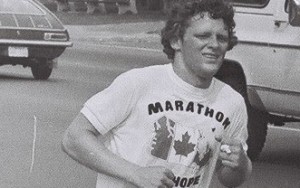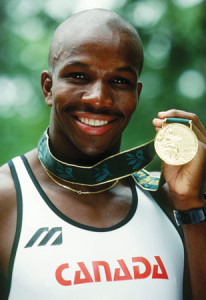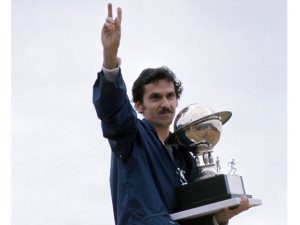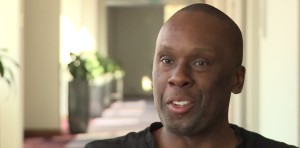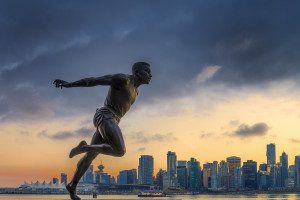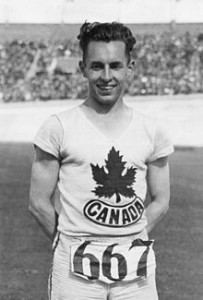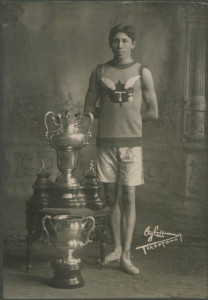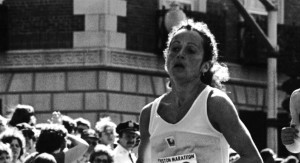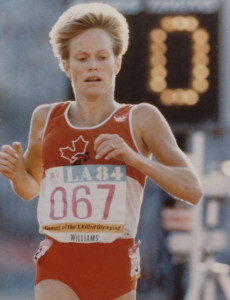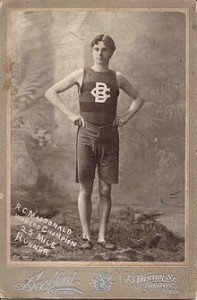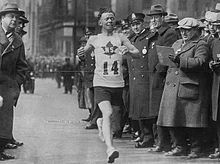Canadian Running Hall of Fame
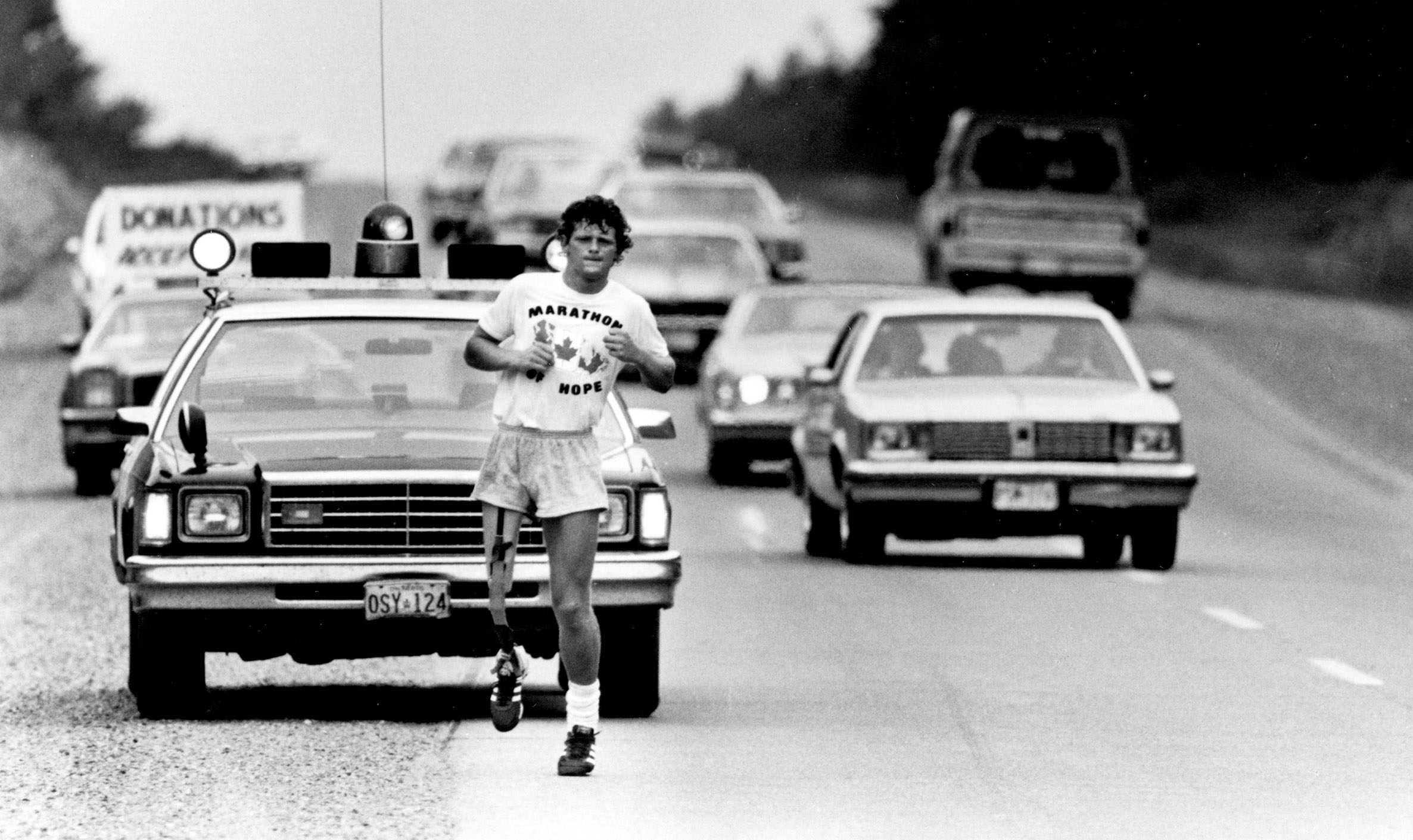
Canada has a running history that is rich in characters, stories, feats of athletic prowess and personal integrity. While here at Canadian Running, we daily cover and enthuse over the feats of current Canadian athletes, for Canada Day we thought we’d spotlight some of the nation’s most amazing runners that have finished their athletic careers. In no particular order, here are our members of the Canadian Running Hall of Fame.
Terry Fox
Undoubtedly the most revered runner in Canadian history, Terry was just 18 when he was diagnosed with bone cancer. Only 11 months after his leg was amputated, Terry began training to run across Canada. His goal: to raise 23 million dollars for cancer research, one dollar for every Canadian at the time. Check out our interactive feature that will take you along Terry’s inspiring run.
Terry Fox’s legacy remains a pillar of Canadian society, with thousands continuing to participate in Terry Fox runs each year.
Donovan Bailey
Canadian sprinter Donovan Bailey was the highlight of the 1996 Olympic Games in which he won the 100m dash and set a new world record. He also anchored the 4×100 relay that stole the gold medal from right under the USA’s fingertips. He still holds the Canadian record, though up and coming 20 year old sprinter, Andre De Grasse, has said that he’s going to be chasing it down.
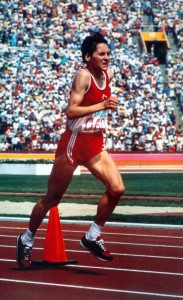
Silvia Ruegger
As a 23 year old, Silvia Ruegger finished 8th in 1984 Olympic Marathon, a race which was only her second time ever running that race distance. In 1985 she set the Canadian women’s marathon record at the Houston Marathon, running 2:28:36. This record remained undefeated for 28 years and was only beaten in recent years by Lanni Marchant and Krista Duchene in the 2013 Scotiabank Toronto Waterfront Marathon.
Ruegger’s career potential was cut tragically short by a car accident that left her unconscious 60 m from her vehicle. Though she returned to 2:30 marathon form, she was never again able to challenge her own record.
Ruegger hasn’t stopped being an inspirational figure in the running community though. She is heavily involved in Start2Finish, a running and literacy program for children in under-resourced communities.
Jerome Drayton
Unbelievably, Jerome Drayton‘s time of 2:10:09, which he ran at the Fukuoka Marathon in 1975, is still the Canadian record, despite the 40 years that have passed.
Few people know that Jerome Drayton was born in Germany with the name Peter Buniak. He moved to Canada with his mother after she divorced his father. He based his new name after two famous sprinters, the former world record holder Harry Jerome and American Paul Drayton.
Along with three winning finishes at the Fukuoka Marathon, Drayton also won the Boston Marathon in 1977.
 Bruny Surin
Bruny Surin
Surin started his Olympic career as a long jumper, finishing 15th at the 1988 Olympics in Seoul. He was part of the 1996 gold medal 4 x 100 relay team. In 1999, he impressed the world by running sub-10 seconds for the 100m dash a total of 6 times
 Harry Jerome
Harry Jerome
Harry Jerome was a sprinter that competed for Canada at the 1960, 1964 and 1968 Olympics. During the course of his career, Jerome set a total of seven world records. Competing in an era before electronic timing (which became widely used in events in 1972), Jerome “tied” many world record times throughout his career. The hand-timing practice was one that left much room for argument between officials.
After retiring from athletics in 1969, Jerome was asked by Prime Minister Pierre Trudeau to play a role in the development of a new Ministry of Sport. The Harry Jerome International Track Classic is an annual high-profile meet held in Burnaby, B.C. If you’re ever running along the Vancouver Sea Wall, keep your eyes peeled for the nine foot gold statue of his Harry Jerome’s likeness.
 Percy Williams
Percy Williams
We went way back with this one. Percy Williams was born in 1908. At the age of 15, Williams suffered a rheumatic fever so severe that doctors suggested he refrain from vigorous physical activity, however, in high school Williams developed a love for sprinting.
He went on to compete at the Olympics in 1928. He and his volunteer coach worked as waiters and dishwashers in order to fund their passage to the games. He won two gold medals in the 100 and 200m dashes at the games.
Later in life, Williams donated his two gold medals to the BC Sports Hall of Fame, so that the public could see them. They were stolen within two weeks.
Tom Longboat
Onondogan-Canadian Tom Longboat was the first non-white world class marathoner. He won the Boston Marathon at only 19 in the year 1907.
As a child he was forced to attend the Mohawk Institute Residential School, from which he ran away from at the age of 12. After his success in athletics, he was invited to return to the school as a speaker, to which he responded that “I wouldn’t even send my dog to that place.”
During the first World War, Longboat served as a running messenger in the trenches, a job that proved so dangerous that he was twice reported to be dead. Consequently, he returned home to find that his wife had remarried.
Check out our full feature on Canada’s most oft overlooked marathon legend, here.
 Jacqueline Gareau
Jacqueline Gareau
Jacqueline Gareau was the true winner of the 1980 Boston Marathon, the year in which Rosie Ruiz was crowned the victor and then determined not to have run the full race distance. Gareau was awarded the victory in a special ceremony a week after the race. Her time was 2:34:28, the fastest female time for the Boston Marathon at that point.
Two years later, Gareau and Ruiz encountered each other at a 10K race. Ruiz continued to refuse to concede that she was not the Boston Marathon champion.
Charmaine Crooks
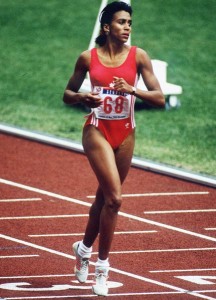
Charmaine Crooks was the first Canadian woman to run the 800m in under 2 minutes (an elite club of five, with Fiona Benson being the latest to join). She competed in five separate Olympic Games, winning a silver medal at the Los Angeles games in 1984 in the 4 x 400m relay.
Crooks went on to serve as a full voting member of the International Olympic Committee from 2000-2004 and served as a Director for the 2010 Vancouver Olympics.
 Lynn Kanuka
Lynn Kanuka
The 1984 LA Olympic 3000m women’s race was an unforgettable one. With the USA’s Mary Decker favoured and the up and coming Zola Budd, who raced barefoot and was racing for the UK after her home-country of South Africa was banned from the games for their apartheid politics.
With an accidental tangle occurring between Budd and Decker, the latter saw her Olympic dreams dashed. This began a long series of persecution against Budd.
Amidst the Budd-Decker drama, Canadian Lynn Williams managed to snag a bronze medal. Since the 3,000m no longer exists as an Olympic distance for women, this is a medal to hold on to.
Williams still currently holds the women’s 1500m record, with a time of 4:00.27.
Ronald J MacDonald
Yes, this Canadian athlete’s name is really Ronald MacDonald. He was the winner of the second ever Boston Marathon, run in 1898. In that year, the race’s field was only 25 people. MacDonald finished with a time of 2:42 without having taken in any fluids during the race. In 1900, MacDonald represented the States at the Olympics, as Canada did not yet have its own Olympic team.
 Johnny Miles
Johnny Miles
Johnny Miles was a Canadian marathoner who won the Boston Marathon in the years 1926 and 1929. He was able to attend the 1926 Boston Marathon thanks to donations from neighbours to cover the cost of a train ticket. He had never previously run a marathon and had actually never raced a distance longer than 16K. On raceday he wore a handmade singlet adorned with the letters “NS” for Nova Scotia, along with 98-cent shoes.
